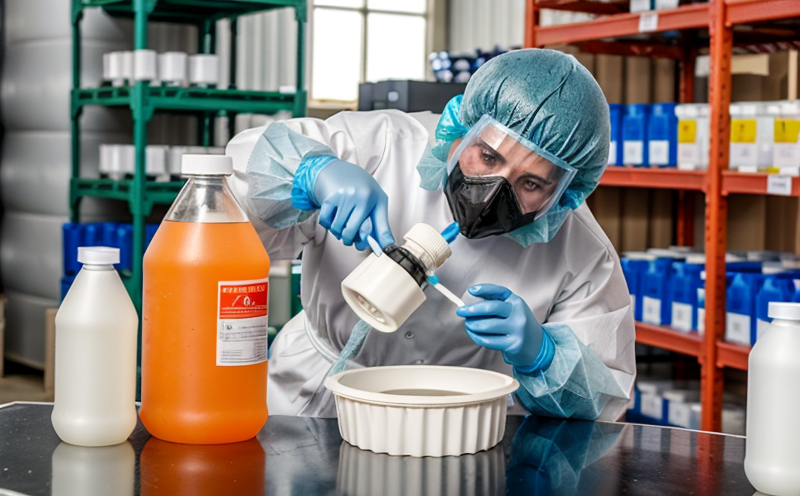ASTM F1608 Microbial Barrier Testing of Porous Packaging Materials
The ASTM F1608 standard specifies a method for determining the microbial barrier properties of porous packaging materials used in food and pharmaceutical packaging. This test is particularly important because it ensures that porous materials like paper, cardboard, or films do not allow microorganisms to pass through, thus maintaining product integrity and safety.
The testing process involves placing the porous material between two chambers containing a known amount of microbial inoculum. The chambers are then separated by the sample, creating an environment where any potential transfer of microorganisms can be monitored. The test is conducted under controlled conditions to simulate real-world exposure scenarios for packaging materials.
This service is crucial in ensuring that food and pharmaceutical products remain safe from contamination during transportation and storage. By complying with ASTM F1608, manufacturers can demonstrate adherence to international standards and gain consumer confidence. This testing procedure helps ensure the quality of porous packaging used across various industries, including medical devices, food processing, and cosmetics.
The test setup typically includes a microbial inoculum source, a porous material sample, and two chambers separated by the sample. The chambers are pressurized to maintain a consistent environment throughout the test duration. The ASTM F1608 method uses specific time intervals for observation, ensuring accurate measurement of barrier properties.
The acceptance criteria for this test involve monitoring the microbial count on both sides of the porous material at various points during the testing period. A successful test is one where no significant increase in microbial counts is observed across the sample. This ensures that the packaging remains a robust barrier against microorganisms, thus protecting the integrity and safety of the packaged goods.
Our laboratory offers comprehensive ASTM F1608 testing services to ensure compliance with industry standards. We provide detailed reports that include all test parameters, specimen preparation methods, instrumentation used, and the results observed. These reports are invaluable for quality managers, R&D engineers, and compliance officers who need to verify the microbial barrier properties of their porous packaging materials.
By ensuring that your packaging meets these stringent standards, you can enhance product safety and trustworthiness in the marketplace. Our experienced team will guide you through every step of the ASTM F1608 testing process, from specimen preparation to final report delivery.
Why It Matters
The importance of microbial barrier testing cannot be overstated in industries where product safety and integrity are paramount. Microbial contamination can lead to spoilage, health risks, and costly recalls. By adhering to ASTM F1608 standards, manufacturers can prevent these issues and maintain a high level of quality control.
Quality managers and compliance officers benefit greatly from this testing service as it provides critical data that supports regulatory compliance and internal quality assurance programs. R&D engineers gain valuable insights into material performance, enabling them to optimize packaging designs for better protection against microorganisms.
For procurement teams, ensuring suppliers meet ASTM F1608 standards ensures consistent product quality across production batches. This service is also beneficial for companies looking to expand their market reach by demonstrating adherence to international quality and safety standards.
Quality and Reliability Assurance
The ASTM F1608 standard plays a vital role in ensuring that porous packaging materials meet the highest levels of microbial barrier performance. This is achieved through rigorous testing protocols designed to simulate real-world conditions accurately.
Our laboratory uses state-of-the-art equipment and techniques to conduct these tests, ensuring precision and reliability in every measurement. The process involves careful preparation of specimens according to ASTM F1608 specifications, followed by precise monitoring under controlled environmental conditions.
The results are meticulously recorded and analyzed, providing clear evidence of the microbial barrier properties of the packaging materials. These reports serve as a valuable resource for decision-makers within organizations, helping them make informed choices about material selection and process improvements.
Use Cases and Application Examples
| Industry Sector | Packaging Material | Description of Use Case |
|---|---|---|
| Food Processing | Cardboard Boxes | Testing ensures that food products remain safe from microbial contamination during transportation. |
| Pharmaceuticals | Paper Bags | Guarantees the integrity of medications and medical devices, preventing cross-contamination. |
| Medical Devices | Films | Aids in maintaining sterility during storage and transport to healthcare facilities. |
| Cosmetics | Plastic Blister Packs | Protects cosmetic products from microbial spoilage, ensuring consumer safety. |
| Fine Chemicals | Glass Jars | Ensures the stability of fine chemicals during shipment and storage. |
| Agricultural Products | Paper Bags | Prevents microbial spoilage in fresh produce and grains, ensuring quality. |
The ASTM F1608 standard is widely applicable across various industries. It ensures that porous packaging materials meet the necessary standards for microbial barrier performance, thereby enhancing product safety and integrity.





